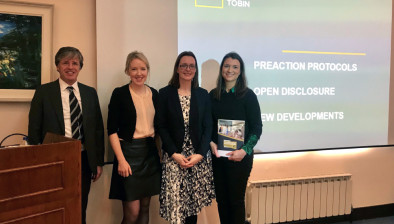NI High Court: Court rejects patients’ judicial review of excessive hospital wait lists

Northern Ireland’s High Court has rejected applications for judicial review into the length of patient wait lists in the jurisdiction.

About this case:
- Citation:[2023] NIKB 2
- Judgment:
- Court:NI High Court
- Judge:Mr Justice Adrian Colton
The court found that although this issue was of public concern, the nature of the situation required political leadership, not court involvement.
Background
These applications centred around the crisis in Northern Ireland regarding the length of time patients are forced to wait for public treatment.
One applicant, Eileen Wilson, a 47-year old woman who lives alone, was referred by her general practitioner for an ‘urgent’ multiple sclerosis assessment. She was advised that the waiting list for neurology appointments was 163 weeks.
The other applicant, May Kitchen, a 75-year-old woman who also lives alone, was diagnosed with cataracts five years ago. She was advised that the necessary operation would not take place for three to four years, due to the length of waiting lists.
Fearful of losing her sight completely, she instead paid for private surgery. She was offered an appointment for private surgery within approximately six weeks.
The applicants’ cases alleged that this treatment reflected a breach of statutory duty by the Department of Health for Northern Ireland and health and social care trusts, and an unjustifiable interference with their Article 8 rights. They argued that the respondents failed to provide primary medical services within Northern Ireland, as outlined in section 2 of the Health and Social Care (Reform) Act (Northern Ireland) 2009.
The evidence
The applicants stated that their case was brought both on their behalf and “on behalf of the general public”. They relied on a report by Professor Deirdre Heenan in support of their applications, which outlined some of the statistics relating to patients in Northern Ireland:
- In 2019 the number of people on a waiting list in NI was 105,486 (population 1.9m) compared to 1,089 in England (population 56m).
- Recent statistics for NI (2021) show approximately one in four people (in a population of 1.9m) are waiting either to see a consultant for the first time or to receive treatment. That figure increased by almost three per cent since June 2021, and by nearly 10 per cent since September 2020.
- Despite official targets stating that no patient should wait longer than 52 weeks for a first appointment, over half of patients have been on a waiting list for more than a year.
Breach of statutory duty?
A key issue for the court was whether the applicants had established a breach of statutory duty.
The respondents contended that the issues raised were “non-justiciable”, arguing that these matters were questions of “macro-political policy” which should be determined by legislature, not the courts. They argued that the court was constitutionally precluded from considering these matters.
The court noted that the statutory duties set out in the 2009 Act are “target duties”, highlighting the Department’s role is merely to “promote” an integrated system of health care.
However, the court also highlighted that there is a distinction between justiciability and reviewability. In considering this point, the applicants pointed to the case of Family Planning Association of Northern Ireland v Minister for Health, Social Services and Public Safety, (SPUCNI) and others intervening [2015] NI 188 as an authority for the proposition that statutory duties under the 2009 Act are reviewable and can be enforced by individuals with a sufficient interest.
In that case, the court considered an application by an association that provided a service for women faced with “unwanted pregnancies”. The association applied for judicial review seeking a declaration that the respondent had acted unlawfully in failing to issue advice and/or guidance to women of childbearing age and to clinicians on the availability and provision of termination of pregnancy services.
There, the court stated that even though a “‘target duty’ does not give rise to an individual right correlative with the duty, it may be enforced by an applicant with a sufficient interest by way of judicial review”.
Consideration
Applying the ratio of the Family Planning Association decision to the facts in this case, the court found that there were apparent differences. Chief amongst these was that the respondents never refused to provide health care.
Based on the evidence, there had been a series of efforts to provide solutions to the issue of waiting lists in the jurisdiction. The issue of waiting times had been identified as a major priority by various Ministers for Health and by the Department itself.
The court found that resolving this issue would involve high level political decisions in relation to resources and in relation to structural reform of the health service, and found that “manifestly, that is not a matter for the courts”.
The judge went on to state: “Whether the problems that arise in relation to waiting lists in the health service are caused by resource issues or strategic issues, or a combination of both is not something which can be measured by any legal standard. This is not a judgment which the court can make.”
Conclusion
Ultimately, the court was cognisant that the applicants were motivated not only by their own position, but by the general state of waiting lists in Northern Ireland, finding that the latter was “clearly a matter of manifest public concern”.
The court went on to accept that a resolution to this issue would be welcomed by all citizens, but particularly by patients and staff alike. However, this matter was found to be one that must be addressed by political leadership and decision making, including leadership within the relevant department and Trusts: “They are the people to make the necessary decisions, not the courts.”
The court argued that the finite resources available to the respondents should be devoted to taking the necessary steps to deal with the problem of waiting lists, rather than defending expensive litigation in the public law sphere in which the courts are unsuited to make the necessary decisions.
For these reasons, the applications for judicial review were dismissed.










